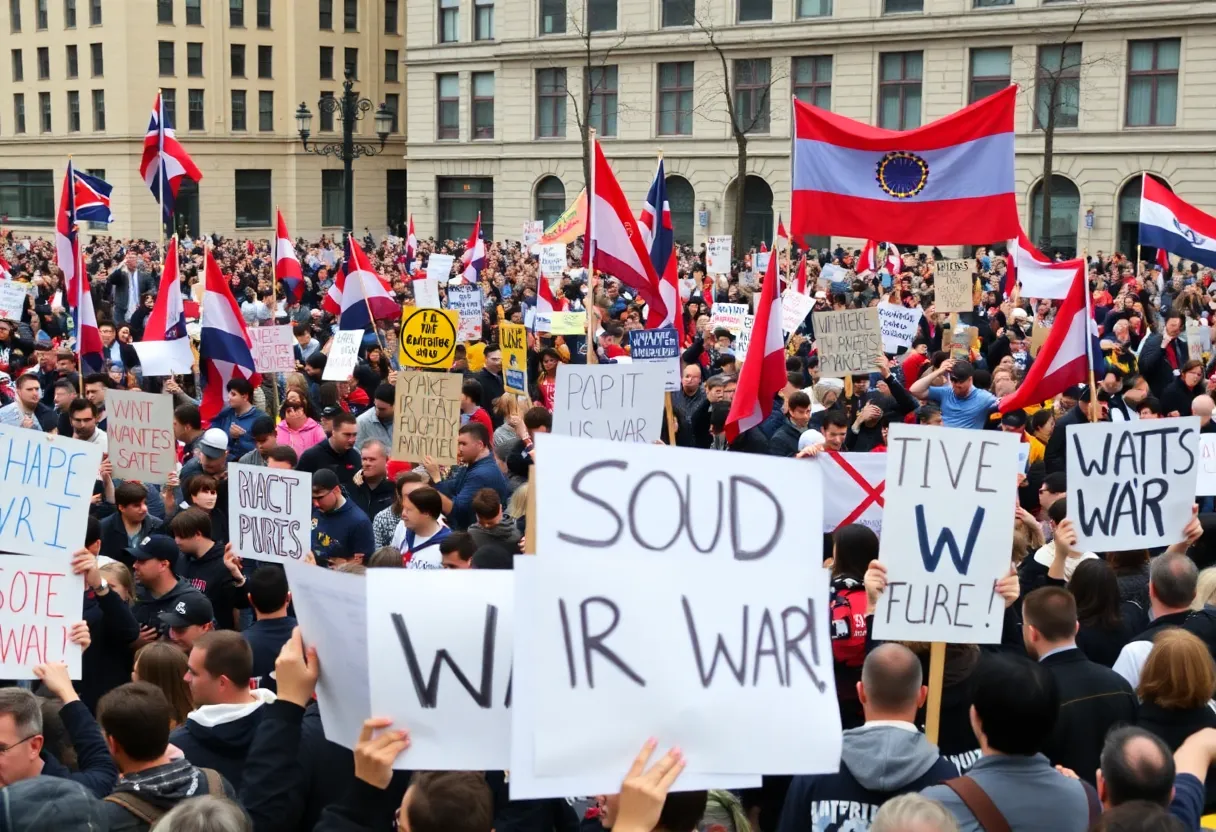News Summary
Dozens of protesters gathered in Lexington’s Courthouse Plaza to oppose recent U.S. military strikes on Iranian nuclear sites authorized by President Trump. Organized by local groups, the rally emphasized the urgency of ceasing further military actions amid fears of escalating conflict. While activists called for peace, some lawmakers supported the military actions as necessary responses to threats posed by Iran. The event highlighted the divide in public opinion and political leadership surrounding U.S. involvement in the Middle East.
Lexington – Dozens of protesters gathered at Lexington’s Courthouse Plaza to express their opposition to recent U.S. military strikes on Iranian nuclear sites. The protest took place less than a day after President Trump authorized the attacks, which many demonstrators fear could escalate into a full-scale war with Iran. The rally was organized on short notice by Noah Cornett, a member of the Bluegrass Democratic Socialists of America, in collaboration with the University of Kentucky chapter of the organization.
The protesters called for a complete ceasefire against Iran, reflecting concerns about the implications of U.S. involvement in the region. Activists emphasized the need to prevent further loss of American lives that could result from escalating military action. Some attendees expressed their views on the potential consequences of ongoing conflict, especially given the historical tensions between the U.S. and Iran.
An anonymous U.S. citizen and international student shared her experiences of witnessing the ongoing conflict between Israel and Iran during a recent trip to Jordan. She highlighted the urgency of the situation and expressed hope that residents of Kentucky would pay attention to America’s role in the conflict. The prompt organization of the protest signifies a growing concern among citizens regarding the government’s military actions.
In contrast to the protesters, Congressman Andy Barr expressed his support for President Trump’s military actions, arguing they were within the president’s constitutional authority. Barr criticized those who opposed the military action, suggesting they aimed to undermine the appropriate use of executive powers in matters of national security. He acknowledged his willingness to support military assistance to Israel, reflecting a bipartisan perspective regarding the U.S.-Israel relationship while maintaining a careful stance on U.S. military involvement in Iran.
Kentucky Senator Mitch McConnell also endorsed the president’s actions, characterizing them as a necessary response to Iran’s longstanding hostility and nuclear ambitions. He reiterated concerns about Iran’s history of aggression and its support for terrorism, framing the recent strikes as an essential measure to mitigate threats posed by a nuclear-armed Iran. Both Barr and McConnell highlighted the risks that a nuclear-armed Iran could pose to regional and global stability.
On the opposing side, Representative Thomas Massie from Northern Kentucky has voiced his disapproval of U.S. involvement in the conflict, claiming “This is not our war.” He filed a resolution against military actions, advocating for Congress to take decisive steps according to constitutional provisions. Massie’s resolution attracted some support from Democrats, signaling a division in the political landscape regarding U.S. military policy in the Middle East.
The gathering in Lexington illustrates the divide in public opinion and political leadership on the issue of military intervention in Iran. While some officials argue that swift military actions are necessary to address immediate threats, others advocate for a more cautious approach that prioritizes diplomatic solutions and congressional oversight. As tensions continue to intensify, both protesters and lawmakers will closely monitor developments and the possible implications of continued U.S. engagement in the region.
The protest reflects both the urgency of public sentiment against military escalation and the complexities of navigating U.S. foreign policy amid growing international tensions. The trajectory of U.S.-Iran relations, especially in the context of military actions, remains a pressing issue that is likely to influence both domestic and international discussions in the coming weeks.
Deeper Dive: News & Info About This Topic
HERE Resources
US Bombs Iranian Nuclear Sites Amid Tensions
U.S. Military Strikes Iranian Nuclear Facilities
Military Tensions Escalate as Israel and Iran Clash
Escalating Tensions: Israel Takes Action Against Iran’s Nuclear Threat
Major Airstrikes Target Iran’s Nuclear Facilities
Israel Launches Major Offensive Against Iran
Additional Resources
- WKYT: Dozens protest against U.S. strikes on Iran
- Wikipedia: Iran–United States relations
- Kentucky.com: Protest Overview
- Google Search: U.S. military intervention in Iran
- Fox 56 News: Lexington No Kings Rally
- Google Scholar: U.S. foreign policy
- Kentucky.com: Political Reactions
- Encyclopedia Britannica: Foreign policy
- Spectrum News: Nationwide Protests
- Google News: U.S. Iran conflict

Author: STAFF HERE LEXINGTON KY STAFF
The LEXINGTON STAFF WRITER represents the experienced team at HERELexingtonKY.com, your go-to source for actionable local news and information in Lexington, Fayette County, and beyond. Specializing in "news you can use," we cover essential topics like product reviews for personal and business needs, local business directories, politics, real estate trends, neighborhood insights, and state news affecting the area—with deep expertise drawn from years of dedicated reporting and strong community input, including local press releases and business updates. We deliver top reporting on high-value events such as Woodland Art Fair, Crave Food and Music Festival, and Railbird Festival. Our coverage extends to key organizations like Commerce Lexington and Blue Grass Community Foundation, plus leading businesses in education, manufacturing, and technology that power the local economy such as University of Kentucky, Toyota Motor Manufacturing, and Lexmark. As part of the broader HERE network, including HEREBowlingGreen.com and HERELouisville.com, we provide comprehensive, credible insights into Kentucky's dynamic landscape.





